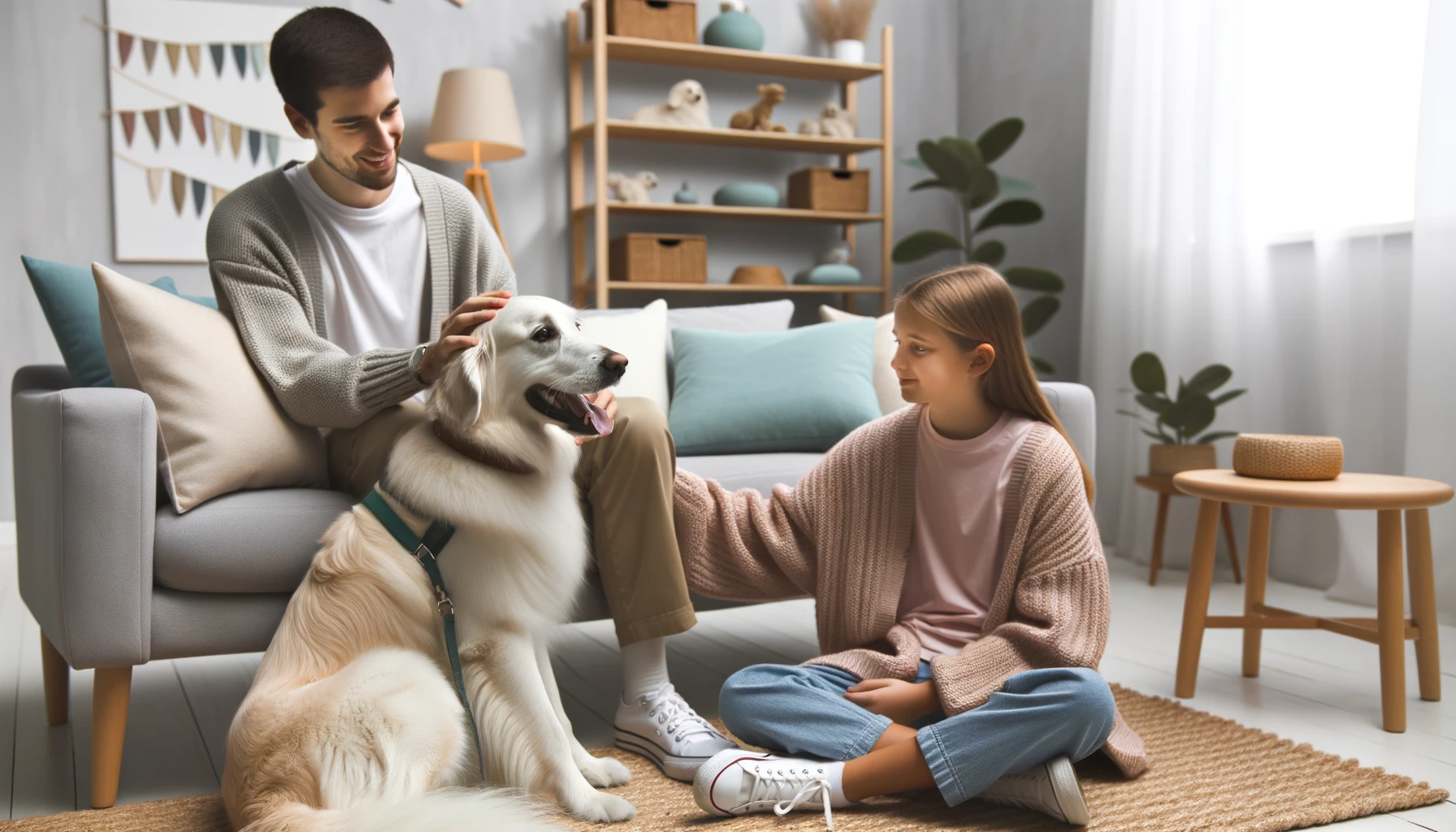
Animal-assisted therapy has emerged as a powerful tool in promoting the well-being of military veterans, offering them a unique and effective form of healing and support. This form of therapy utilizes specially trained animals, particularly therapy dogs, to provide emotional healing and wellness to veterans. The therapeutic benefits of animals for veterans, especially those suffering from post-traumatic stress disorder (PTSD), are significant.
Key Takeaways:
- Animal-assisted therapy offers veterans a unique and effective form of healing and support.
- Therapy dogs play a crucial role in reducing symptoms of anxiety and hypervigilance in veterans.
- Animals provide positive redirection, distracting veterans from negative feelings and reminding them of their surroundings.
- Companionship and social interaction with therapy dogs help reduce feelings of isolation for veterans.
- Animals, particularly emotional support animals, can alleviate symptoms of depression and improve overall well-being for veterans.
The Role of Therapy Dogs in Supporting Veterans
Therapy dogs are integral to the success of animal-assisted therapy programs for veterans, offering a range of benefits that contribute to their overall well-being and emotional recovery. These specially trained dogs play a crucial role in supporting veterans by reducing symptoms of anxiety and hypervigilance, providing positive redirection, and offering companionship and social interaction.
Reducing Symptoms of Anxiety and Hypervigilance: Veterans who have experienced trauma often struggle with anxiety and hypervigilance, constantly scanning their environment for potential threats. Therapy dogs help to alleviate these symptoms by providing a sense of safety and security. Their calming presence and non-judgmental nature create a soothing environment that allows veterans to relax and feel more at ease.
Positive Redirection: Dogs have a remarkable ability to redirect attention and focus. When veterans are caught up in negative thoughts or memories, therapy dogs can offer positive distractions, redirecting their attention towards the present moment. This helps to break the cycle of rumination and provides a reminder of the immediate surroundings, grounding veterans in reality.
Companionship and Social Interaction: One of the most significant benefits therapy dogs provide is companionship and social interaction. Veterans often experience feelings of isolation and loneliness, especially when transitioning back to civilian life. Therapy dogs offer unconditional love and acceptance, providing a source of comfort, companionship, and emotional support. Interacting with dogs can also facilitate socialization, as dogs act as icebreakers and create opportunities for connecting with others.
In summary, therapy dogs play a vital role in supporting veterans through animal-assisted therapy. Their presence reduces symptoms of anxiety and hypervigilance, offers positive redirection, and provides companionship and social interaction. As the use of animal-assisted therapy for veterans continues to grow, the benefits of therapy dogs in promoting overall well-being and emotional recovery are becoming increasingly recognized and valued.
| Benefits of Therapy Dogs for Veterans | Summary |
|---|---|
| Reduces symptoms of anxiety and hypervigilance | Creating a sense of safety and security |
| Provides positive redirection | Breaking the cycle of negative thoughts and memories |
| Offers companionship and social interaction | Alleviating feelings of isolation and loneliness |
Emotional Healing and Wellness through Animal Therapy
Animal therapy provides a vital source of emotional healing and wellness for veterans, allowing them to find solace, companionship, and a sense of belonging through their interactions with animals. For those suffering from post-traumatic stress disorder (PTSD) and other mental health issues, the therapeutic benefits of animal therapy are truly remarkable.
Therapy dogs play a pivotal role in supporting veterans on their healing journey. These specially trained dogs have a unique ability to reduce symptoms of anxiety and hypervigilance. With their calming presence and unconditional love, therapy dogs provide emotional support and positive redirection, easing veterans’ negative feelings and reminding them of their surroundings. The bond between a therapy dog and a veteran goes beyond companionship—it offers a sense of safety and security, helping veterans overcome feelings of isolation.
“Having a therapy dog has changed my life. My dog gives me a reason to get out of bed every morning and helps me feel connected to the world again,” says John, a veteran who credits his furry companion with his path to recovery. Emotional support animals like therapy dogs provide unwavering love and acceptance, alleviating symptoms of depression and promoting overall well-being for veterans.
The Power of Animal-Assisted Therapy
Research has shown that animal-assisted therapy has a profound impact on veterans’ mental health. In one study, veterans who participated in animal-assisted therapy reported reduced levels of anxiety, improved mood, and a greater sense of social connectedness. The results were undeniable—interacting with animals not only provided immediate emotional relief but also contributed to long-term healing and resilience for veterans.
| Benefits of Animal Therapy for Veterans |
|---|
| Reduces symptoms of anxiety and hypervigilance |
| Provides positive redirection and distraction from negative feelings |
| Alleviates feelings of isolation and promotes social interaction |
| Relieves symptoms of depression and improves overall well-being |
The power of animal-assisted therapy lies in its ability to tap into the innate connection between humans and animals. By welcoming animals into their lives, veterans find comfort, support, and healing—a testament to the incredible bond that can exist between humans and their furry companions.
Expanding Programs and Lasting Impact
As the benefits of animal-assisted therapy for veterans gain recognition, programs that pair therapy dogs with veterans are expanding, resulting in a profound and lasting impact on the lives of those involved. These programs provide a unique and holistic approach to healing, addressing the mental, emotional, and physical well-being of veterans.
Therapy dogs play a crucial role in supporting veterans by reducing symptoms of anxiety and hypervigilance. Trained to provide positive redirection, these dogs help veterans focus on the present moment and distract them from negative thoughts or memories. Additionally, therapy dogs offer unconditional love and acceptance, creating a powerful bond that can alleviate symptoms of depression and provide emotional support.
The impact of these programs extends beyond the veterans themselves. The dogs that serve in these programs also experience significant benefits, finding purpose and fulfillment in their role as therapy animals. The companionship and social interaction they provide contribute to their own well-being, resulting in a mutually beneficial relationship between the dogs and the veterans.
| Benefits of Expanding Animal Therapy Programs for Military Veterans |
|---|
| Reduces symptoms of anxiety and hypervigilance |
| Provides positive redirection and distraction |
| Alleviates symptoms of depression |
| Offers companionship and social interaction |
| Promotes exercise and physical health |
With the growing recognition of the therapeutic benefits of animal-assisted therapy for veterans, these programs are becoming increasingly available. They aim to enhance the well-being and quality of life for veterans by providing them with the support and care they deserve. By expanding these initiatives, we can make a lasting impact on the lives of both veterans and the dogs that serve alongside them.
Promoting Physical and Mental Well-being
Animal therapy programs for veterans not only promote their mental well-being but also contribute to their physical health, creating a holistic approach to healing and resiliency. The therapeutic benefits of animals for veterans are extensive, and animal-assisted therapy (AAT) has been proven to have significant positive effects on those suffering from post-traumatic stress disorder (PTSD).
One of the key ways that animal therapy supports veterans is through the use of therapy dogs. These specially trained dogs play a vital role in reducing symptoms of anxiety and hypervigilance. They offer emotional healing and wellness by providing positive redirection, effectively distracting veterans from negative feelings and reminding them of their surroundings.
Dogs also serve as valuable companions, offering social interaction and alleviating feelings of isolation. They provide a source of social activity and a constant presence in the lives of veterans, which can greatly enhance their overall well-being. Additionally, therapy dogs can help relieve symptoms of depression by offering unconditional love and acceptance, providing a sense of comfort and emotional support.
Furthermore, owning a dog as part of an animal therapy program promotes physical health as well. Dogs require regular exercise, which encourages veterans to engage in physical activities, leading to improved physical well-being. This positive impact on their physical health, in turn, positively affects their mental health, creating a comprehensive and holistic approach to healing and resiliency.
FAQ
What is animal-assisted therapy (AAT) for veterans?
Animal-assisted therapy (AAT) for veterans is a therapeutic approach that involves using animals, specifically therapy dogs, to support veterans in their healing and resiliency journey. Animals provide emotional healing and wellness, offering companionship, reducing anxiety, and providing positive redirection.
How do therapy dogs support veterans?
Therapy dogs support veterans by reducing symptoms of anxiety and hypervigilance, providing positive redirection, and offering companionship and social interaction. They help veterans feel less isolated and provide a source of emotional support and unconditional love.
What are the emotional healing and wellness benefits of animal therapy for veterans?
Animal therapy, particularly through emotional support animals, can alleviate symptoms of depression, reduce feelings of isolation, and provide unconditional love and acceptance. Animals play a significant role in improving the emotional well-being of veterans.
How do programs that pair therapy dogs with veterans make a lasting impact?
Programs that pair therapy dogs with veterans make a lasting impact by improving the lives of both the veterans and the dogs. These programs provide support, companionship, and a sense of purpose for veterans, while also giving the dogs a meaningful role in helping others.
How does owning a dog promote physical and mental well-being for veterans?
Owning a dog promotes physical and mental well-being for veterans by promoting exercise and physical health. The companionship and responsibility of owning a dog also contribute to improved mental health and overall well-being.
Source Links
- https://www.disabilitynetwork.org/blog/pawsitively-powerful-7-ways-therapy-and-service-dogs-help-veterans/
- https://www.va.gov/WHOLEHEALTHLIBRARY/tools/animal-assisted-therapies.asp
- https://health.mil/Military-Health-Topics/Centers-of-Excellence/NICOE/Clinical-Programs-and-Services/Clinical-Services/Rehabilitation-and-Wellness-Services/Animal-Assisted-Therapy



